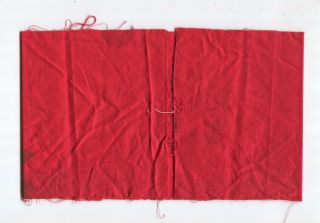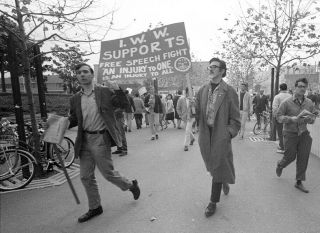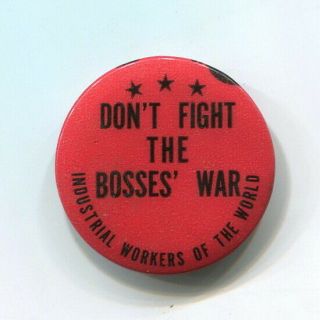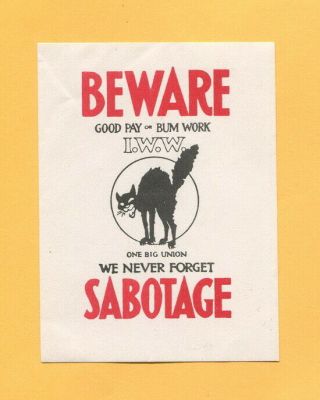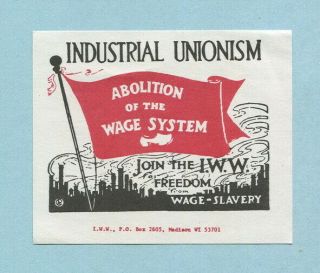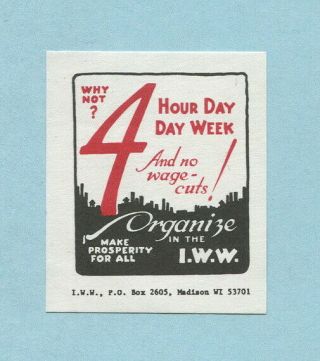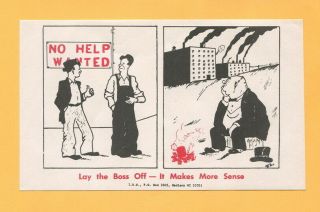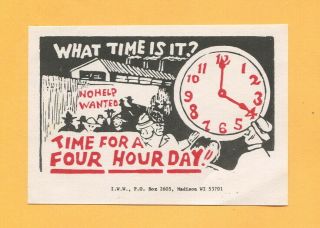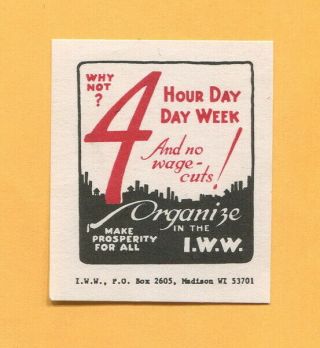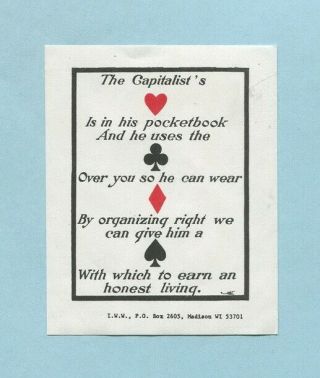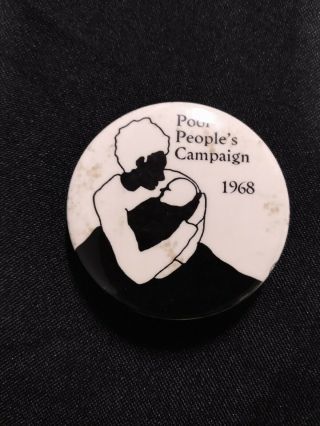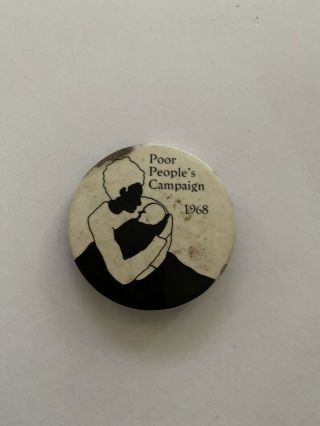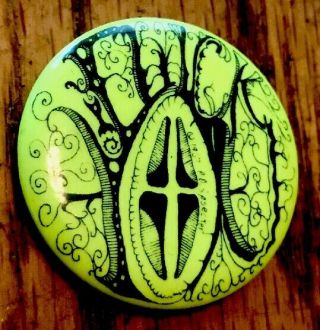1960s IWW ARMBAND Industrial Workers Of The World Labor Union Protest Cause
Item History & Price
| Reference Number: Avaluer:15056234 |
OFFERED FOR SALE IS THIS CLOTH ARMBAND, MEASURING 5 1/2 INCHES WIDE BY 18 INCHES LONG, IN WHAT I BELIEVE TO BE REALLY NICE SHAPE, EXCEPT FOR A FEW MINOR STAINS ON WHAT WOLD BE THE INSIDE OF THE ARMBAND WHEN WORN ON THE ARM, AS SHOWN IN PHOTOS. ARMBAND AS DISPLAYED MEASURES 9 INCHES.
MY BELIEF AS TO CONDITION IS ONLY THAT. SEE PHOTOS FOR CONDITION, AND YOU B...E THE JUDGE. IF YOU HAVE ANY QUESTIONS, PLEASE CONTACT ME BEFORE BIDDING OR BUYING. GUARANTEED AUTHENTIC AND ORIGINAL AS DESCRIBED. RETURNS ARE NOT ACCEPTED UNLESS THE ITEM IS NOT THE SAME ONE DESCRIBED OR SHOWN IN THE PHOTOS OR HAS SIGNIFICANT DAMAGE OR DEFECTS NOT VISIBLE IN THE PHOTOS OR OTHERWISE DESCRIBED.
This Armband was issued in the mid to late 1960s to members of the Industrial Workers of the World (IWW) and worn by them at protests, marches, demonstrations, on picket lines, etc. To be worn, the ends would be stitched together (one white thread remains) or pinned together with a safety pin. Often, the armband would also be safety pinned to the wearer's shirt or jacket sleeve, to help prevent it from sliding down the arm.
Printed on the armband is the Official Label of the IWW. (See below for activities of the IWW in 1960s and photos (which are not included with armband.)
The Industrial Workers of the World ( IWW ), whose members have been commonly called "Wobblies", is an international labor union that was founded in 1905 in Chicago, Illinois in the United States of America. The IWW combined general unionism with industrial unionism, as it is a general union whose members are further organized within the industry of their employment. The philosophy and tactics of the IWW are described as "revolutionary industrial unionism", with ties to both socialist and anarchist labor movements.In the 1910s and early 1920s, the IWW achieved many of their short-term goals, particularly in the American West, and cut across traditional guild and union lines to organize workers in a variety of trades and industries. At their peak in August 1917, IWW membership was more than 150, 000, with active wings in the U.S., Canada and Australia. The extremely high rate of IWW membership turnover during this era (estimated at 133% per decade) makes it difficult for historians to state membership totals with any certainty, as workers tended to join the IWW in large numbers for relatively short periods (e.g., during labor strikes and periods of generalized economic distress).The IWW promoted the concept of "One Big Union" and contends that all workers should be united as a social class to supplant capitalism and wage labor with industrial democracy. They are known for the Wobbly Shop model of workplace democracy, in which workers elect their managers and other forms of grassroots democracy (self-management) are implemented. IWW membership does not require that one work in a represented workplace, nor does it exclude membership in another labor union.THE I.W.W. IN THE 1960sIn the 1960s civil rights movement, anti-war protests, and various university student movements brought new life to the IWW, albeit with many fewer new members than the great organizing drives of the early part of the 20th century.The first signs of new life for the IWW in the 1960s would be organizing efforts among students in San Francisco and Berkeley, which were hotbeds of student radicalism at the time. This targeting of students would result in a Bay Area branch of the union with over a hundred members in 1964.
Wobblies old and new would unite for one more "free speech fight": Berkeley's Free Speech Movement. Riding on this high, the decision in 1967 to allow college and university students to join the Education Workers Industrial Union (IU 620) as full members spurred campaigns in 1968 at the University of Waterloo in Ontario, the University of Wisconsin in Milwaukee, and the University of Michigan in Ann Arbor.The IWW sent representatives to Students for a Democratic Society ( SDS ) conventions in 1967, 1968, and 1969, and as the SDS collapsed into infighting, the IWW would gain members who were fleeing this discord. These changes would have a profound effect on the union, which by 1972 would have sixty-seven percent of members under the age of thirty, with a total of nearly five hundred members.The IWW's links to the 60s counterculture led to organizing campaigns at counterculture businesses, as well as a wave of over two dozen co-ops affiliating with the IWW under its Wobbly Shop model in the 1960s to 1980s. These businesses were primarily in printing, publishing, and food distribution; from underground newspapers and radical print shops to community co-op grocery stores.
This underground pinback button pin or badge relates to the Hippie (or Hippy) Counterculture Movement of the psychedelic Sixties (1960's) and Seventies (1970's). That movement included such themes and topics as peace, protest, civil rights, radical, socialist, communist, anarchist, union labor strikes, drugs, marijuana, pot, weed, lsd, acid, sds, iww, anti draft, anti war, anti rotc, welfare rights, poverty, equal rights, integration, gay, women's rights, black panthers, black power, left wing, liberal, etc. progressive political movement and is guaranteed to be genuine as described.
THIS IS MY HOBBY AND IS NOT A BUSINESS. THIS AND MY OTHER ITEMS ON EBAY ARE FROM MY PERSONAL COLLECTIONS AND WERE NOT INITIALLY ACQUIRED BY ME FOR RESALE. PROCEEDS GO TO BUY OTHER STUFF I AM INTERESTED IN COLLECTING.
I AM A MEMBER OF A. P. I .C. (AMERICAN POLITICAL ITEMS COLLECTORS). IF YOU ARE NOT A MEMBER, YOU SHOULD CONSIDER JOINING. IT IS A GREAT ORGANIZATION!SHIPPING: ITEMS WILL BE SAFELY PACKED TO AVOID DAMAGE DURING SHIPPING. ITEMS ARE SHIPPED BY FIRST CLASS MAIL, ITEMS ARE SHIPPED WITHIN A BUSINESS DAY OR TWO OF RECEIPT OF PAYMENT.
I WILL REDUCE SHIPPING CHARGES ON MULTIPLE ITEMS. For each additional item, add $ .50 (fifty cents).
ALL I ASK IS THAT YOU LET ME KNOW YOU WOULD LIKE A COMBINED SHIPPING PRICE BEFORE PAYING SO I CAN INVOICE YOU WITH THE REDUCED SHIPPING COSTS.
SHIPPING TO DESTINATIONS WITHIN THE UNITED STATES BY FIRST CLASS MAIL IS $4.00.
IF YOU WOULD LIKE YOUR ITEMS SENT BY PRIORITY MAIL INSTEAD, PLEASE LET ME KNOW BEFORE PAYING SO I CAN SEND YOU AN INVOICE FOR THE INCREASED AMOUNT.
OUTSIDE THE UNITED STATES, SHIPPING IS $15.00 FOR FIRST CLASS MAIL.
IF YOU WOULD LIKE YOUR ITEMS SENT BY INTERNATIONAL PRIORITY MAIL INSTEAD, PLEASE LET ME KNOW BEFORE PAYING, SO I CAN SEND YOU AN INVOICE FOR THE INCREASED AMOUNT (APPROX $30). I WILL REDUCE SHIPPING CHARGES ON MULTIPLE ITEMS. For each additional item, add $ .50 (fifty cents).
ALL I ASK IS THAT YOU LET ME KNOW YOU WOULD LIKE A COMBINED SHIPPING PRICE BEFORE PAYING SO I CAN INVOICE YOU WITH THE REDUCED SHIPPING COSTS.The Deacons emerged as one of the first visible self-defense forces in the South and as such represented a new face of the civil rights movement. Traditional civil rights organizations remained silent on them or repudiated their activities. They were effective however in providing protection for local African Americans who sought to register to vote and for white and black civil rights workers in the area. The Deacons, for example, provided security for the 1966 March Against Fear from Memphis to Jackson, Mississippi. Moreover their presence in Southeastern Louisiana meant that the Klan would no longer be able to intimidate and terrorize local African Americans without challenge.
The strategy and methods that the Deacons employed attracted the attention and concern of the Federal Bureau of Investigation (FBI), which authorized an investigation into the group’s activities. The investigation stalled, however, when more influential black power organizations such as US and the Black Panther Party emerged after the 1965 Watts Riot. With public attention, and the attention of the FBI focused elsewhere, the Deacons lost most of their notoriety and slowly declined in influence. By 1968 they were all but extinct. In 2003 the activities of the Deacons was the subject of a 2003, “Deacons for Defense.” - See more at: HTTPS://www.blackpast.org/aah/deacons-defense-and-justice#sthash.s6D3h3ZZ.dpufOn July 10, 1964, a group of African American men in Jonesboro, Louisiana led by Earnest “Chilly Willy” Thomas and Frederick Douglas Kirkpatrick founded the group known as The Deacons for Defense and Justice to protect members of the Congress of Racial Equality (CORE) against Ku Klux Klan violence. Most of the “Deacons” were veterans of World War II and the Korean War. The Jonesboro chapter organized its first affiliate chapter in nearby Bogalusa, Louisiana led by Charles Sims, A.Z. Young and Robert Hicks. Eventually they organized a third chapter in Louisiana. The Deacons tense confrontation with the Klan in Bogalusa was crucial in forcing the federal government to intervene on behalf of the local African American community. The national attention they garnered also persuaded state and national officials to initiate efforts to neutralize the Klan in that area of the Deep South.
The Deacons emerged as one of the first visible self-defense forces in the South and as such represented a new face of the civil rights movement. Traditional civil rights organizations remained silent on them or repudiated their activities. They were effective however in providing protection for local African Americans who sought to register to vote and for white and black civil rights workers in the area. The Deacons, for example, provided security for the 1966 March Against Fear from Memphis to Jackson, Mississippi. Moreover their presence in Southeastern Louisiana meant that the Klan would no longer be able to intimidate and terrorize local African Americans without challenge.
The strategy and methods that the Deacons employed attracted the attention and concern of the Federal Bureau of Investigation (FBI), which authorized an investigation into the group’s activities. The investigation stalled, however, when more influential black power organizations such as US and the Black Panther Party emerged after the 1965 Watts Riot. With public attention, and the attention of the FBI focused elsewhere, the Deacons lost most of their notoriety and slowly declined in influence. By 1968 they were all but extinct. In 2003 the activities of the Deacons was the subject of a 2003, “Deacons for Defense.” - See more at: HTTPS://www.blackpast.org/aah/deacons-defense-and-justice#sthash.s6D3h3ZZ.dpufOn July 10, 1964, a group of African American men in Jonesboro, Louisiana led by Earnest “Chilly Willy” Thomas and Frederick Douglas Kirkpatrick founded the group known as The Deacons for Defense and Justice to protect members of the Congress of Racial Equality (CORE) against Ku Klux Klan violence. Most of the “Deacons” were veterans of World War II and the Korean War. The Jonesboro chapter organized its first affiliate chapter in nearby Bogalusa, Louisiana led by Charles Sims, A.Z. Young and Robert Hicks. Eventually they organized a third chapter in Louisiana. The Deacons tense confrontation with the Klan in Bogalusa was crucial in forcing the federal government to intervene on behalf of the local African American community. The national attention they garnered also persuaded state and national officials to initiate efforts to neutralize the Klan in that area of the Deep South.
The Deacons emerged as one of the first visible self-defense forces in the South and as such represented a new face of the civil rights movement. Traditional civil rights organizations remained silent on them or repudiated their activities. They were effective however in providing protection for local African Americans who sought to register to vote and for white and black civil rights workers in the area. The Deacons, for example, provided security for the 1966 March Against Fear from Memphis to Jackson, Mississippi. Moreover their presence in Southeastern Louisiana meant that the Klan would no longer be able to intimidate and terrorize local African Americans without challenge.
The strategy and methods that the Deacons employed attracted the attention and concern of the Federal Bureau of Investigation (FBI), which authorized an investigation into the group’s activities. The investigation stalled, however, when more influential black power organizations such as US and the Black Panther Party emerged after the 1965 Watts Riot. With public attention, and the attention of the FBI focused elsewhere, the Deacons lost most of their notoriety and slowly declined in influence. By 1968 they were all but extinct. In 2003 the activities of the Deacons was the subject of a 2003, “Deacons for Defense.” - See more at: HTTPS://www.blackpast.org/aah/deacons-defense-and-justice#sthash.s6D3h3ZZ.dpufOn July 10, 1964, a group of African American men in Jonesboro, Louisiana led by Earnest “Chilly Willy” Thomas and Frederick Douglas Kirkpatrick founded the group known as The Deacons for Defense and Justice to protect members of the Congress of Racial Equality (CORE) against Ku Klux Klan violence. Most of the “Deacons” were veterans of World War II and the Korean War. The Jonesboro chapter organized its first affiliate chapter in nearby Bogalusa, Louisiana led by Charles Sims, A.Z. Young and Robert Hicks. Eventually they organized a third chapter in Louisiana. The Deacons tense confrontation with the Klan in Bogalusa was crucial in forcing the federal government to intervene on behalf of the local African American community. The national attention they garnered also persuaded state and national officials to initiate efforts to neutralize the Klan in that area of the Deep South.
The Deacons emerged as one of the first visible self-defense forces in the South and as such represented a new face of the civil rights movement. Traditional civil rights organizations remained silent on them or repudiated their activities. They were effective however in providing protection for local African Americans who sought to register to vote and for white and black civil rights workers in the area. The Deacons, for example, provided security for the 1966 March Against Fear from Memphis to Jackson, Mississippi. Moreover their presence in Southeastern Louisiana meant that the Klan would no longer be able to intimidate and terrorize local African Americans without challenge.
The strategy and methods that the Deacons employed attracted the attention and concern of the Federal Bureau of Investigation (FBI), which authorized an investigation into the group’s activities. The investigation stalled, however, when more influential black power organizations such as US and the Black Panther Party emerged after the 1965 Watts Riot. With public attention, and the attention of the FBI focused elsewhere, the Deacons lost most of their notoriety and slowly declined in influence. By 1968 they were all but extinct. In 2003 the activities of the Deacons was the subject of a 2003, “Deacons for Defense.” - See more at: HTTPS://www.blackpast.org/aah/deacons-defense-and-justice#sthash.s6D3h3ZZ.dpufOn July 10, 1964, a group of African American men in Jonesboro, Louisiana led by Earnest “Chilly Willy” Thomas and Frederick Douglas Kirkpatrick founded the group known as The Deacons for Defense and Justice to protect members of the Congress of Racial Equality (CORE) against Ku Klux Klan violence. Most of the “Deacons” were veterans of World War II and the Korean War. The Jonesboro chapter organized its first affiliate chapter in nearby Bogalusa, Louisiana led by Charles Sims, A.Z. Young and Robert Hicks. Eventually they organized a third chapter in Louisiana. The Deacons tense confrontation with the Klan in Bogalusa was crucial in forcing the federal government to intervene on behalf of the local African American community. The national attention they garnered also persuaded state and national officials to initiate efforts to neutralize the Klan in that area of the Deep South. - See more at: HTTPS://www.blackpast.org/aah/deacons-defense-and-justice#sthash.s6D3h3ZZ.dpuf
THANK YOU FOR YOUR INTEREST.
00137




